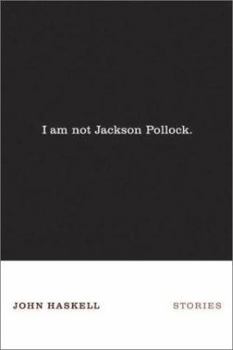I Am Not Jackson Pollock
Select Format
Select Condition 
Book Overview
A bewitching collection of short fiction--haunting and hypnotic meditations on art, movies, literature, and life A circus elephant named Topsy was executed at Coney Island in the year 1900 for killing a man. That's true. So is the life of Saartjie (Sar-key) Baartman, the Hottentot Venus, who was herself a circus act in the first half of the nineteenth century. What is myth is the Indian god Ganesha, whose head was lopped off by his father, Shiva,...
Format:Hardcover
Language:English
ISBN:0374173990
ISBN13:9780374173999
Release Date:January 2003
Publisher:Farrar Straus Giroux
Length:192 Pages
Weight:0.80 lbs.
Dimensions:0.8" x 5.7" x 8.6"
Customer Reviews
4 ratings
Best Book I've Read This Year
Published by Thriftbooks.com User , 20 years ago
Believe the review on this page that says the book is astonishing. I've never read anything quite like it. Why would anyone who read it call it "senseless" - ? That reader really missed the mark. This is fascinating writing - the author is a master at seeing similarities between things which, on the surface, are dissimilar. From high culture to low, Haskell brings it all together into one frame. I recommend it wholeheartedly to anyone interested in ficition that isn't dead in the water. If you're tired of formulaic writing, this one will wake you up. This is infused with motion and risk. A lovely book, my favorite of many read in the last year.
Vagaries in the search of reality
Published by Thriftbooks.com User , 21 years ago
John Haskell is a writer new to the reading (though not the performing) world and his voice is one that stirs interest, primarily because it is unique. He tells these nine 'short stories' - they seem more like extended meditations or themes and fugues - in a manner that combines known public figures (a particular penchant for old movie stars and old movies) with imaginary cast members to explore the thin line of reality vs fiction. He makes bizarre choices in combining such people as Orson Welles, Joseph Coton, Falstaff, Prince Hal and Janet Leigh to ponder self perception:"...once we think we know who we are, to change who we are means giving up what we love, even if we hate it." The haiku poet Basho is intertwined with thoughts about John Keats; Keats falls short of relating to Fanny Brawne until he faces his moment of death; Basho confesses he "...wants to find beauty and harmony, but something is always distracting him - people usually - pulling him off the road." Mercedes McCambridge, the devil voice of Linda Blair in "The Exorcist", struggles with alcoholism, Joan of Arc is recallled historically and through the various guises of the actress who portrayed her in the film. Sound confusing? Well it is, and sometimes the obtuseness of Haskell's technique borders on not the absurd, but the senseless. I think we're seeing the early work of a mind that is rich in fluid imagination. I feel as though this author has a lot to say but is hiding behind the likes of Jackson Pollock and Joan of Arc and Ganesha for fear of not being noticed. I don't think he needs this gimmick and I eagerly await his next novel. He WILL be noticed on his own rights.
An author to watch
Published by Thriftbooks.com User , 21 years ago
Publisher's Weekly (editorial reviews) describes the nature of this book far better than the previous customer review. Haskell is ambitious, knows this work is perversely anomalous, but isn't motivated by difference for its own sake. He's winnowed down what really interests him in fiction and is relying on myth, news accounts, and film scenarios the way a composer might riff on familiar melodies. None of these pieces (though in a sense the complete book has an inviolate structure of its own) was transcendent, however. I was interested but not rapt. No sirens or fireworks went off. But Haskell is nonetheless an artist in the best sense; he is after something beyond the familiar confines of fiction, is following his own muse without apology or a need to ingratiate himself with the reader, and I have a strong hunch that his best efforts lie ahead. He is original, focused, and definitely a writer to watch.
Terrific premise with very good execution.
Published by Thriftbooks.com User , 21 years ago
John Haskell's first short story collection takes key figures from history, identifies them at defining moments in their existence and builds a story around them to explain their significance. It's an interesting take on the short story, which some say is a dying art, and Haskell does good work, for the most part. His premise, though, turns the "stories" into more analysis of moment than a narrative. Occasionally, the stories become bogged down and feel like essays, though this is itself is intellectually stimulating.He gives the reader a look inside Jackson Pollock's head in one piece, granting you the opportunity to follow Pollock's reasoning. In "Elephant Feelings," the best of the stories, Haskell takes three figures from culture and history and draws parallels between them. (It feels like a shorter version of "The Hours," even, except with mythical characters and an elephant playing the Virginia Woolf part.) But not enough is done with the premise, in my opinion.As with all the stories, I felt like the characters and moments were well-drawn. But, to justify going into all this detail, I wished it'd featured less analysis and more plot.






